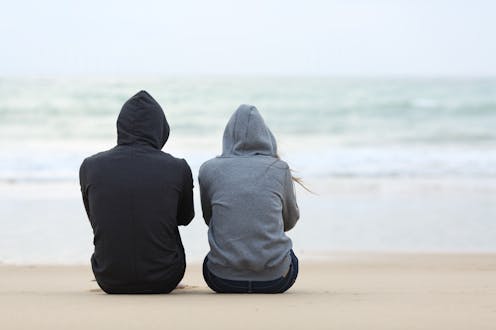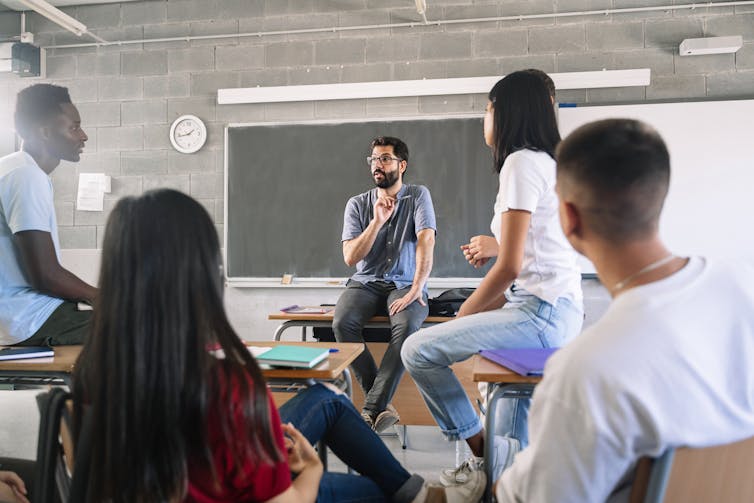
Nearly half of young people aged between 13 and 17 who have been in a relationship in the past year have experienced violent or controlling behaviour, according to a recent survey from charity the Youth Endowment Fund.
The finding comes from a survey of 10,000 young people in England and Wales, of which 27% had been in a relationship in the past year.
This evidence of abuse in teen relationships comes against a background of sexual harassment and abuse perpetrated by young people against their peers. Over half of the 106,984 child sexual abuse cases in 2022 – the most recent data – in England and Wales involved reported offences by young people aged between ten and 17. This is a rise of 7.6% from 2021.
A 2021 survey by schools regulator Ofsted found that sexual harassment is a common aspect of school life for a majority of pupils.
The Everyone’s Invited website, an online space for survivors of sexual abuse to anonymously share their stories, has received over 50,000 testimonials of sexual harassment and violence from young people since it was set up in 2021.
Lacking education
Effective relationships and sex education should teach young people about how to conduct healthy relationships. But it is evident that many children and young people are being failed by the sex and relationships education they receive.
Research in this area shows that many children and young people are receiving education on sex and relationships that is too little too late. They are being taught what they already know.
The Youth Endowment Fund survey found that less than half of the 10,000 children in their study had received education on how to build a healthy and respectful romantic relationship.
Unfortunately, this aspect of the curriculum is often sidelined, with very little time specifically dedicated to sex and relationships education.
This is a problem. What children learn in school shouldn’t just lead to a set of exam results. It should equip them to live and thrive in society.
It is important for educators to involve parents and carers in these conversations to ensure that children are getting consistent messages at school and at home.
Teachers should also have training that ensures that they feel equipped and confident to deliver good relationships and sex education sessions.
Schools need to create safe spaces for learning and open and frank conversations with children and young people about both healthy and toxic relationships. Research by one of us (Sophie King-Hill) has shown that pupils and staff can work together to develop robust and realistic relationships and sex education.

Training in bystander intervention may also help reduce sexual violence. Bystander intervention is where those in the community who are aware of sexual abuse, domestic violence and anti-social behaviour are encouraged to intervene on behalf of the victim.
However, this must be considered carefully when applied to young people. They may risk putting themselves in psychologically and physically damaging situations.
Additionally, most bystander intervention initiatives are designed for the physical environment. Children and young people live their lives both online and offline, and it is unclear what an online version of bystander intervention could look like.
Including young people
Sex and relationships education needs to focus on young men and boys. Reports demonstrate that boys and men are more likely to carry out sexual harms. However, this needs to be carried out with the best interest of all genders in mind and to be free from blame and judgement. Young men and boys should be included and seen as valuable contributors in finding a solution.
Understanding the seamless online and offline worlds for young people should also be at the forefront of sessions on healthy relationships. This learning by professionals can only come from the perspectives of children and young people themselves.
One of the most important aspects of approaching sessions such as these are the voices of young people, who are experts in both the digital and non-digital world around them and how these two aspects interconnect and what they need from professionals to understand and negotiate these worlds.
Current sex and relationships education is not working as it should and many children and young people are suffering as a consequence. We need to make it easy for young people to have open conversations and seek support when they need it.
Evidence based, robust and realistic relationships and sex education that is underpinned by the needs of children and young people can help create this environment for discussion and support.
Sophie King-Hill receives funding from the ESRC.
Kieran McCartan receives funding from EU Horizon 2020 & NHS Bristol Vanguard.
This article was originally published on The Conversation. Read the original article.







